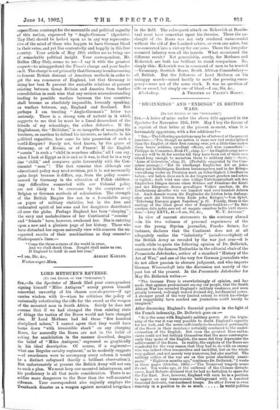LORD METHUEN'S REVERSE.
[TO THE EDITOR OF THE "SPECTATOR.")
SIB,—In the Spectator of March 22nd your correspondent signing himself "Miles Antiquua " surely proves himself somewhat unworthy of his chosen nom-de-guerre—if age carries wisdom with it—when he criticises the policy of universally substituting the rifle for the sword as the weapon of the mounted man in South Africa. Surely he does not assume that if we had changed the then existing state of things the tactics of the Boers would not have changed also. If Lord Methuen had led those "five hundred disciplined sabres," I cannot agree that they would have borne down "with irresistible shock" on any charging Boers, for assuredly the Boers are not in the habit of asking for annihilation in the manner described, despite the belief of "Miles .Antiquus," expressed so graphically in his ideal description. Of course, if a regiment— 'L but one Regular cavalry regiment," as he modestly suggests —of swordsmen were to accompany every column it would be a distinct safeguard (hardly a brilliant observation!). But unfortunately at present the British Army will not run to such a plan. We must keep our mounted infantryman, and his proficiency is all that needs consideration. There is no soldier more dangerous to the Boer than the well-mounted rifleman. Your correspondent also unjustly employs the Tweebosch disaster as a weapon against mounted irregulars in the field. The subsequent attack on Kekewich at Rooide- vaal must have somewhat upset his theories. There the on- slaught of the Boers was not only rendered unsuccessful without the aid of five hundred sabres, or even one sabre, but was converted into a victory for our arms. There the irregular mounted infantry won all the laurels. What occasioned the different result? Not generalship, surely, for Methuen and Kekewich are both too brilliant to stand comparison. No, simply this : Kekewich was in command of men to be trusted —Yeomanry, Scottish Horse, South African Constabulary— all British. But the followers of Lord Methuen on 'his unhappy march—raised hastily to meet the pressing emer- gency—were not of the same stock. It was no question of rifle or sword, but simply one of blood.—I am, Sir, eec., K 1 erksdorp. A TROOPER OF PAGET'S HORSE.










































 Previous page
Previous page